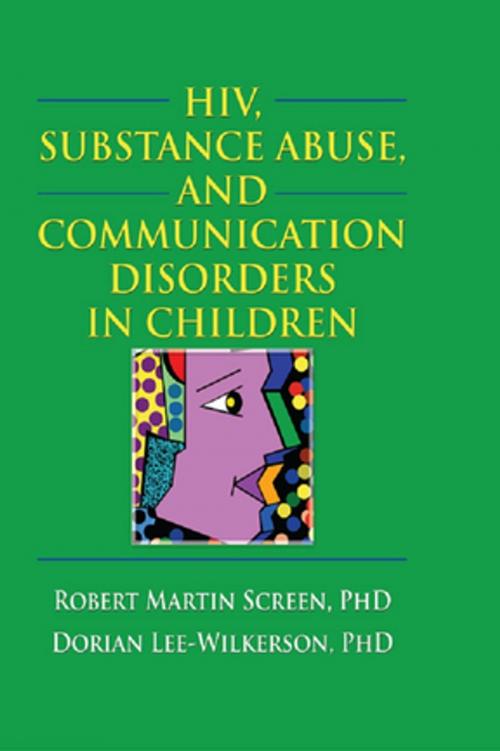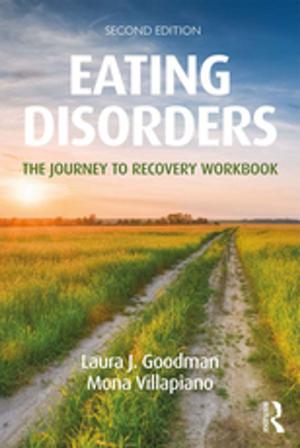HIV, Substance Abuse, and Communication Disorders in Children
Nonfiction, Health & Well Being, Health, Ailments & Diseases, AIDs & HIV, Reference & Language, Language Arts, Communication| Author: | R. Dennis Shelby, Robert M. Screen | ISBN: | 9781136431715 |
| Publisher: | Taylor and Francis | Publication: | January 11, 2013 |
| Imprint: | Routledge | Language: | English |
| Author: | R. Dennis Shelby, Robert M. Screen |
| ISBN: | 9781136431715 |
| Publisher: | Taylor and Francis |
| Publication: | January 11, 2013 |
| Imprint: | Routledge |
| Language: | English |
Make sure every child gets a chance to be heard
HIV, Substance Abuse and Communication Disorders in Children examines the language problems of young children from special populations. Essential as a textbook for graduate and upper-level undergraduate studies and as a reference resource, this unique book presents up-to-date research and compelling case studies that illustrate how prenatal exposure to drugs, alcohol, and HIV can affect a child in utero and continue to handicap its development after birth. Each chapter includes discussion threads and review questions to promote critical thinking and clinical problem-solving skills in the classroom.
HIV, Substance Abuse and Communication Disorders in Children looks at the negative impact a mother’s lifestyle practices can have on her developing child with a nod toward the significant prevalence of HIV and substance abuse in today’s society. Some estimates place the number of infants born after prenatal exposure to illicit drugs as three-quarters of a million-every year. When alcohol is added, the figure rises to more than 1 million. This powerful book focuses specifically on the serious consequences of alcohol, marijuana, cocaine, and crack cocaine abuse, including poor language development and speech delays, limited vocabulary, the inability to make their needs known, poor articulation, the inability to follow commands, limited expressive language skills, and the inability to understand the real meaning of words and generalize them. And of the nearly 5,000 children in the United States living with AIDS, almost all will struggle with speech production and communication disorders as the disease affects their brain, spinal cord, and central nervous system.
HIV, Substance Abuse and Communication Disorders in Children examines:
-
the effect of drugs on the brain
-
pregnancy and drug use trends
-
common drugs of abuse
-
Kosakoff’s syndrome
-
fetal alcohol syndrome (FAS) among Native Americans and African Americans
-
neurologic sequellae
-
speech and language intervention
-
rehabilitation considerations
-
treatment and family counseling
-
and much more
HIV, Substance Abuse and Communication Disorders in Children is essential for graduate and undergraduate students working with language disorders in special populations.
Make sure every child gets a chance to be heard
HIV, Substance Abuse and Communication Disorders in Children examines the language problems of young children from special populations. Essential as a textbook for graduate and upper-level undergraduate studies and as a reference resource, this unique book presents up-to-date research and compelling case studies that illustrate how prenatal exposure to drugs, alcohol, and HIV can affect a child in utero and continue to handicap its development after birth. Each chapter includes discussion threads and review questions to promote critical thinking and clinical problem-solving skills in the classroom.
HIV, Substance Abuse and Communication Disorders in Children looks at the negative impact a mother’s lifestyle practices can have on her developing child with a nod toward the significant prevalence of HIV and substance abuse in today’s society. Some estimates place the number of infants born after prenatal exposure to illicit drugs as three-quarters of a million-every year. When alcohol is added, the figure rises to more than 1 million. This powerful book focuses specifically on the serious consequences of alcohol, marijuana, cocaine, and crack cocaine abuse, including poor language development and speech delays, limited vocabulary, the inability to make their needs known, poor articulation, the inability to follow commands, limited expressive language skills, and the inability to understand the real meaning of words and generalize them. And of the nearly 5,000 children in the United States living with AIDS, almost all will struggle with speech production and communication disorders as the disease affects their brain, spinal cord, and central nervous system.
HIV, Substance Abuse and Communication Disorders in Children examines:
-
the effect of drugs on the brain
-
pregnancy and drug use trends
-
common drugs of abuse
-
Kosakoff’s syndrome
-
fetal alcohol syndrome (FAS) among Native Americans and African Americans
-
neurologic sequellae
-
speech and language intervention
-
rehabilitation considerations
-
treatment and family counseling
-
and much more
HIV, Substance Abuse and Communication Disorders in Children is essential for graduate and undergraduate students working with language disorders in special populations.















